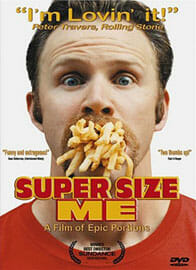Super Size Me

Super Size Me is a lively and accessible account of director Morgan Spurlock’s attempt to spend 30 days eating nothing but McDonald’s food—for breakfast, lunch and dinner—while doctors monitor the changes in his vital statistics. It’s an increasingly important topic. As a society, we’ve built a machine that saves us dollars at the cash register but requires us to pay them back in health bills down the road.
The movie accomplishes some of its more modest goals: it makes fast food look disgusting, makes the serving sizes seem outrageous and, perhaps most importantly, makes the food programs at many schools seem alarmingly poor at both providing nutritious meals and developing healthy eating habits. But when it begins to feel more like a publicity stunt than an object lesson, the movie earns less attention. Spurlock, who is already talking about plans to parlay the movie’s momentum into a reality series for a cable network, has developed three rules for his 30-day binge: he can only eat or drink what’s available at McDonald’s, he can only choose the “super size” option if the cashier offers it to him, and he must eat every item on the menu at least once during the 30 days.
Looking at these rules, it’s hard to see what the goal of the stunt is. Is it to magnify the average customer’s diet, to speed it along like time-lapse photography? The second rule provides a hint. From the outset Spurlock intends to stuff himself, and he does. Once he’s off and running, it’s not clear why he ignores his nutritionist who says that his fast food diet is giving him about 5000 calories per day when he only needs 2500. Twice she suggests cutting out the shakes and the sodas, and yet he continues eating shakes and drinking sodas to the end. Whether his goal is to approximate the average visit to McDonald’s or ensure results for his movie project isn’t clear.
-

-

-

-

-

-

-

-

-

-

-

-

-

-

-

-

-

-

-

-

-

-

-

-

-

-

-

-

-

-

-

-

-

-

-

-

-

-

-

-








































